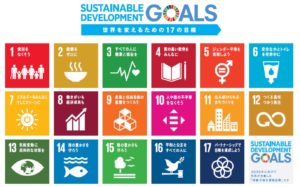IDJ ENGLISH
『International Development Journal』2018 July edition
Momentum that encourages companies to realise Sustainable Development Goals (SDGs) and to develop new business is gathering pace in the development consultancy industry. As Official Development Assistance (ODA) decreases, efforts are turning toward bridging local companies in Japan and developing countries, standardising the SDGs business and promoting various efforts.
Food hygiene inspection in Cambodia
The company named Spec Co., located in Tokushima City, that has developed a food hygiene inspection business, is now preparing to open the very first hygiene laboratory in Cambodia. It has provided “hygiene services” for approximately 4,000 customers, including enterprises and municipalities, in meat and fishery processing, noodle making, confectionery manufacturing, as well as the “Food Doctor” for the past 35 years since its foundation. However, while limiting domestic demand, they have decided to expand their overseas business.
Although economic development is good in Cambodia, standards for sanitary control pertaining to food processing have not been established. They anticipate that demand will increase in the future and they have been preparing to launch the Cambodian business from 2012.
This project was adopted in the subsidiary scheme of “Jump out of Japan! (The Assistance Project for Supporting Development in the World’s Growing Market)” in which the Ministry of Economy, Trade and Industry (METI) has been supporting social problem-solving companies since FY 2016.
In FY 2018, it was also selected for the Japan International Cooperation Agency (JICA) Overseas Development Project for Small and Medium Enterprises.
It was backed up by the development consultant, IC Net Ltd.. They are assigned with the management of selecting businesses for “Jump out of Japan!”. One of the evaluation criteria is its usefulness in achieving the goals of SDGs.
“SDGs” Goal 2 is to end hunger, achieve food security and improved nutrition, as well as to promote sustainable agriculture “. In concrete terms, it is said that “weak people, such as the poor and young children, can always get safe and nutritious foods”. Food hygiene inspection was adopted precisely due to this goal.
“Hero show” on TV in Thailand
“Jump out of Japan!” supports even more unique projects. In order to cheer up the children of Northeast Japan that encountered The Great East Japan Earthquake, Seigi-no-Mikata (Friend of Justice) Ltd., of Nikaho-shi, Akita Prefecture, created a hero character named “Tohoku God Miraiger” and nurtured a popular program on local TV. The company devised programs for the overseas market, starting with Thailand.
They made a Thai language version with a Thai hero and, since the fall of 2016, televised it once a week at a TV station in Thailand. As tourism to Japan is very popular among Thai people, and sightseeing information in Japan is also included in the program, it is enjoyed even by adults. Twenty-four programs have already been aired.
Anyway, why does this business meet with SDGs? According to Mr. Morihiro Tada, the representative director of IC Net Ltd., the production company for the project that helps out, METI officers initially wondered, “Will it really be of any use in solving social problems?”
However, such hero programs are not merely children’s entertainment. The plot of ” punitive justice ” that defends women, children, poor people and other weak people. while punishing evil, is a wonderful educational program that teaches children peace and virtue.
The SDGs “Goal 4″ calls for ” Ensuring inclusive and quality education for all and promoting lifelong learning”, “Sustainable lifestyle, human rights, gender equality, a culture of peace and non-violence, global citizens, cultural diversity and other education.
Looking at the efforts of these two companies, a development consultant can mediate between government policies and a new “SDG business model” coupled with local companies and developing countries. The “Jump out of Japan!” scheme that started in FY 2015 has already subsidised 28 companies in 11 industries in 19 countries up to 50 million yen.
President Tada said, “MDGs seemed to be goals for developing countries, and Japanese companies did not take a “common language” when going out to developing countries. However, as SDGs emerged, they took a “common language”. As the development consultant who knows the needs of the frontline in the developing countries, we are aware of the fact that the government, local governments and enterprises are interested in social problem-solving projects. It is a big opportunity to demonstrate our presence and the significant role it plays.”
The company continues to regularly exchange views on SDGs with eight major companies that operate globally. “Large enterprises do not need to settle for new businesses in SDGs. SDGs have 17 goals and 169 targets and are involved in core business. We help them to “define” it and improve the value chain. By doing so, the effect of SDGs can be raised”, Mr. Tada says.
Efforts to standardise business reporting
Meanwhile, there are attempts to create formats to evaluate companies’ SDG businesses on a common scale. The International Development Center of Japan Inc., (IDCJ) established the SDGs section at the beginning of this year.
According to the director of the section, Mr. Hisaaki Mitsui, the Government Pension Investment Fund (GPIF), which operates the public pension fund of Japan, signed the United Nations Responsible Investment Principles (PRI) in 2015 and expanded “ESG Investment” to manage funds from a viewpoint of the environment, society and governance. With this trend, the major enterprises’ efforts of SDGs have become active. The Keidanren, the Federation of Economic Organisations of Japan, revised the Charter of Corporate Code with emphasis on SDGs in 2016, which was also helpful.
Large enterprises are responding to the movement of capital markets where GPIF and domestic and foreign institutional investors judge the investment of stocks etc. from the viewpoint of SDGs and ESG. However, even if they expand the business that leads to social problem-solving, there is no clear common scale to evaluate it, and efforts are disjointed.
IDCJ has a track record of studying the evaluation method of ODA projects and has knowledge on the field of developing countries, such as supporting the Indonesian Government’s implementation of the SDGs plan. They hope to make use of this and to create a format to write business reports based on common indicators for companies’ SDGs efforts.
Mr. Mitsui said, “SDGs, themselves, are primarily written for governments and are not documents for companies to follow. Unless standardisation of SDG business reports is considered, it will not only fail to expand CSR (corporate social responsibility) but it will also be unsustainable. “
In the background of serious efforts toward SDGs of the development consultancy industry, such as IDCJ and IC Net, is sluggish growth of ODA-related business, which accounts for the majority of those companies’ sales. Is it possible for them to nurture “SDG consulting” with companies as part of their diversification? It seems that it will depend on the understanding of SDGs in Japanese society and the business community.
Senior Journalist Yukifumi Takeuchi
***** 以下、日本語原文 *****
SDGs特集
開発コンサルタント業界の取り組み地方と開発途上国をつなぐSDGsビジネス
カンボジアで食品衛生検査
徳島市に本社を置き、食品の衛生検査事業を展開する(株)スペックが今、カンボジア初の衛生検査所の開設準備を進めている。
同社は創業以来35年、「食のお医者さん」を掲げ、食肉・水産加工、製麺業、菓子製造の企業や自治体など約4,000の顧客に衛生サービス事業を提供してきた。しかし、国内需要に限界が見える中、海外進出に踏み切った。
カンボジアは経済発展が好調だが、食品加工に関する衛生管理の基準は確立されていない。今後、その需要が高まると予想し、同社は2012年から事業の立ち上げ準備を進めてきた。この事業は16年度、経済産業省が社会問題解決型企業を支援する「飛び出せJapan! 世界の成長マーケットへの展開支援補助事業」に採択された。18年度は国際協力機構(JICA)の中小企業海外展開支援事業(案件化調査)にも選ばれた。
その後押しをしたのは、開発コンサルタントのアイ・シー・ネット(株)だ。飛び出せJapan!の補助事業採択の業務を委託されている。その評価基準の一つは、SDGsの目標実現に役立つか、どうかだ。
SDGsの「目標2」は、「飢餓に終止符を打ち、食糧の安定確保と栄養状態の改善を達成するとともに、持続可能な農業を推進する」ことだ。その具体的内容としては「貧困層や幼児などの弱者が常に安全で栄養のある食糧を十分得られるようにする」とされる。食品の衛生検査はまさにこれに合致する、と採択された。
タイで「ヒーロー番組」TV放映
飛び出せJapan!は、さらにユニークな事業も支援している。秋田県にかほ市のプロダクション、(株)正義の味方だ。東日本大震災に遭った東北の子供たちを元気づけようと、「東北合神ミライガー」と名づけたヒーローを生み出し、地方局のテレビで人気番組に育てた。さらに同社は、番組の海外への提供を発案し、タイに進出した。
タイ人のヒーローを起用したタイ語版を製作し、16年秋からタイのテレビ局で週1回放映している。タイ人の間では日本への観光旅行が人気だ。日本の観光地の情報も番組に織り込んだため、大人の間でも楽しまれている。番組はすでに24本放映された。
それにしても、この事業のどこがSDGsに合致するのだろうか。飛び出せJapan!の支援事業に同社を採択したアイ・シー・ネットの代表取締役、多田盛弘氏によると、経産省担当者も最初は首を傾げたという。「本当に社会問題解決に役立つのか」という疑問だった。
しかし、ヒーローものは単なる子供向け娯楽番組ではない。正義の味方が女性や子供、貧困層など弱者を守り、悪を懲らしめる「勧善懲悪」の筋立ては、子供に平和と徳を教える立派な教育番組だ。
SDGsの「目標4」は「すべての人々に包摂的かつ公平で質の高い教育を提供する」ことを求め、「持続可能なライフスタイル、人権、ジェンダー平等、平和と非暴力の文化、グローバル市民、文化的多様性」などの教育を挙げている。
この両社の取り組みを見ると、開発コンサルタントが政府の政策を仲立ちし、地方企業と開発途上国が結合した新たな「SDGsビジネスモデル」が見てとれる。15年度に始まった飛び出せJapan!では、すでに19カ国11業種28社が最大5,000万円の補助を受けた。
多田社長は「MDGsは開発途上国の話だと思われ、日本企業が途上国に出ていくための“共通言語”にならなかった。しかし、SDGsが登場して『これは“共通言語”になる』と直感した。政府と自治体、企業が社会問題解決型事業に関心を強め、アクターが増えることによって開発協力の垣根が崩れてきた。途上国の現場のニーズを知る開発コンサルタントとしては、存在意義を発揮する大きなチャンスだ」と語る。
同社は、グローバルに事業展開する大企業8社ともSDGsについての定期的な意見交換を続けている。「大企業はSDGsで新事業をしようと身構える必要はない。SDGsは17目標と169のターゲットがあり、本業の中に関わりがある。それを“定義づけ”するのを手伝い、バリューチェーンを改善することによってSDGsの効果が上げられる」と、多田氏はいう。
事業報告の標準化の取り組みも
一方、企業のSDGsビジネスを共通尺度で評価するため、フォーマット作りをする試みもある。開発コンサルタントの(株)国際開発センター(IDCJ)は年初にSDGs室を設け、取り組みを本格化した。
室長の三井久明氏によると、日本の公的年金基金を運用する年金積立金管理運用独立行政法人(GPIF)が15年、国連の責任投資原則(PRI)に署名し、環境・社会・ガバナンスの視点から資金を運用する「ESG投資」を拡大しつつある。この流れを背景に、大企業のSDGsの取り組みが活発化してきた。経団連が16年、SDGsを重視して企業行動憲章を改定したことも追い風になった。
大企業は、GPIFや国内外の機関投資家がSDGs とESGの観点から株式などの投資を判断する資本市場の動きに対応しつつある。ところが、社会的な問題解決につながる事業を拡大しても、それを評価する明確な共通尺度はなく、取り組みはバラバラだ。
IDCJは、ODA事業の評価方法を研究してきた実績がある上、インドネシア政府のSDGs実施計画作りを支援するなど開発途上国の現場での知見がある。これを生かし、日本企業のSDGsの取り組みについて各企業が共通の指標に基づいた事業報告書を書くためのフォーマットを作成していく考えだ。
三井氏は「SDGs自体は主に各国政府が実現をするために書かれたものに過ぎず、企業が取り組むための文書になっていない。SDGs事業報告の標準化を考えないと、企業は従来型のCSR(企業の社会的責任)を拡大するばかりになりかねず、持続的でない」と語る。
IDCJやアイ・シー・ネットなど開発コンサルタント業界がSDGsに真剣な取り組みを見せる背景には、売上高の大半を占めるODA関連事業の伸び悩みもある。企業を相手にした「SDGsコンサルティング」を多角化の一環に育てられるか、どうか。それは、日本社会と経済界のSDGs理解の広がりにかかっていると言えそうだ。
本誌編集委員 竹内 幸史



